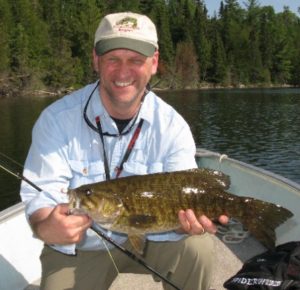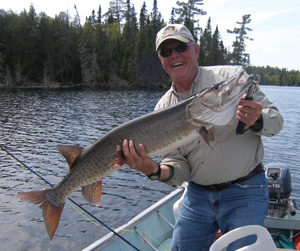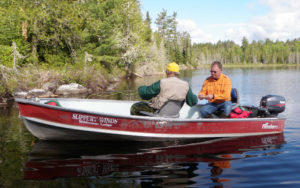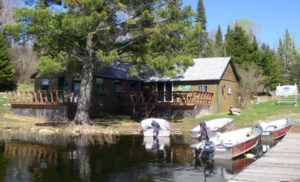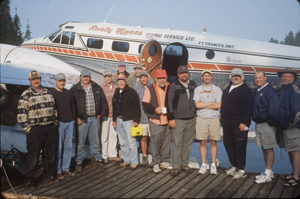What are the Waters Like?
All six of the forest-fringed lakes we fish are clear to slightly stained, with rocky shorelines and wood cover. There are miles of fishy shorelines, numerous islands, rocky points and small bays.
Is All of the Fishing Done by Boat?
Yes, we use motor boats to fish all six of the lakes. There is no wade or shore fishing. Trip guests get an easy-to-read map that allows everyone to safely navigate the waters and target the best spots. The trip host knows these waters very well, and will direct you to the best fishing areas.
What Are “Self-Guided” Trips?
For an extra fee, a lodge staff member can be hired as a guide. But most guests do self-guided fishing, which means that you handle your own boat. Generally, two guests go out in a boat each day and take turns operating the boat. The trip hosts often go out in the boats with different guests each day, and they can help match you up with a boat partner if you don’t already have one.
How is This Trip for a Solo Traveler?
Actually, this trip is particularly good for someone coming on their own, without bringing a fishing buddy. Dan Johnson, the trip host, will match you up with others in a cabin and fishing boats according to your skills and interests. And Dan goes out fishing with different guests each day, so if you come on your own you’re more likely to get to fish with Dan than do guys who bring their own buddies.
Plus, our whole group of fly fishers has meals and evening seminars together and we coordinate which lakes everyone will fish each day, so we’re all part of the whole group, rather than just being with whoever you came with.
Because of all this, many solo travelers have come on these trips and had a great experience. And many of them have long-lasting friendships with guys they got to know on one of our trips.
What are the Boats Like?
Boats on the main lake are full-sized 16-footers with 15- or 20-horsepower outboards and transom-mounted electric motors. These boats also have casting decks that allow comfortable stand-up fly casting. The motors are easy to operate, and you can also use anchors for boat control when winds are strong and when you want to fish one spot for an extended period. On the three walk-in lakes, there are 14-foot boats equipped with 9.9 horsepower outboards.
What Casting Skills are Required?
For successful warmwater lake fishing, it’s best if you can easily cast a bass-sized fly 50 feet. Casting instruction is offered in the evenings at the lodge, to fine-tune your skills and make sure you have the right rods and lines for lake fishing. But good casting takes practice over a longer period of time. To get the most out of your trip, you should also practice casting these moderate distances at home beforehand.
What are the Cabins and Lodge Like?
Slippery Winds Lodge has five well-equipped cabins ranging from 2- to 6-person size. All cabins have refrigerators, showers and flush toilets. For cool nights, cabins have propane space heaters. The lodge building has a beautiful pine interior with dining and lounge areas.
Will We Have TV and Internet?
Yes, the lodge has satellite TV and internet access. There is no cell phone service, but guests can use the lodge’s telephone at any time to make and receive calls.
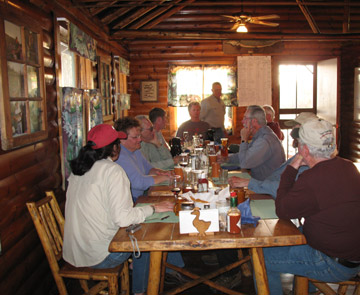
Fly fishing group at the lodge
What about Meals?
Hearty and nutritious breakfasts and dinners are served in the lodge by the friendly and competent kitchen staff. Bag lunches are prepared daily to take out fishing, and you choose which sandwiches and beverages you prefer each day.
What Flies Will We Use?
Various topwater and subsurface flies are used depending on water temperatures and fish activity. And a big advantage of taking a Smallmouth Angler trip is the “Traveling Fly Shop” that your host, Dan Johnson, brings to the lodge– a generous assortment of proven patterns, based on decades of lake fishing experience. Whatever the conditions, your host will be able to provide you with appropriate flies. Additionally, the “fly shop” includes custom wire leaders, extra fly rods, reels, lines and leader material.
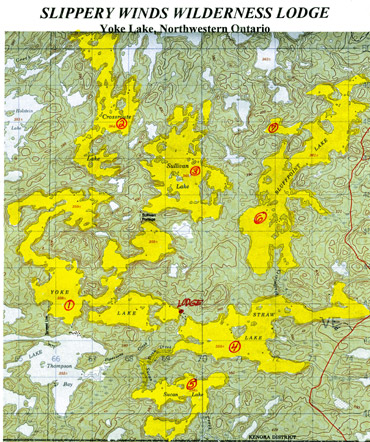
A map of the six lakes to fish
How Accessible Are the Portage Lakes?
The lodge’s primary lakes are boat accessible and require no walking to reach. These are all of the 3 smallmouth lakes and the one musky lake we have access to. Two other lakes (known for largemouth and pike) require an easy 400- to 500-yard walk through the woods, where boats and motors are waiting. The sixth lake (a largemouth and lake trout hotspot) is the most challenging, requiring a short boat trip up a shallow stream, then a 500-yard walk to reach. This gives guests a wide variety of water to choose from, depending on fish activity and the angler’s physical capabilities.
Is a Canadian Lake Trip Right for Me?
If you only like wade fishing or casting little flies with an ultra-light rod, then this trip isn’t for you. But if you can comfortably cast bass-sized flies on an 8-wt rod, and you want to catch powerful fish in a beautiful, uncrowded setting, then this may be a perfect experience for you. A multi-species, multi-lake trip means some fish are almost always biting. And this trip is far more affordable than Alaskan trout/steelhead trips and northern Canadian pike trips.
Why this Specific Trip?
Certainly, there are numerous other lodges in Ontario. But our trips are the only ones hosted by a professional angling instructor who has decades of Ontario fly fishing experience. At other lodges, fly fishers are on their own, but on Smallmouth Angler trips you receive as much assistance as you desire, both before and during the trip. And because these are group trips you will be with other friendly and helpful fly fishers, rather than a lodge full of bait-chuckers.
If I’m coming from a long distance away, what’s the best way to get to Fort Frances?
Guests coming from the Midwest can easily drive directly to the float plane in Fort Frances, Ontario. Those coming from other parts of the U.S. should consider flying to Minneapolis and then renting a car. Air travel to the Minneapolis/St Paul airport is easy and inexpensive, and round-trip weekly car rentals at the airport are, too.
The 5-hour drive from Minneapolis to the float plane service is on good highways. And there is free, secure parking for you at the float plane base. Guests may also fly with a local airline from Minneapolis to International Falls/Fort Frances. However, there are only two flights a day and they are about twice as expensive as renting a car and driving up.
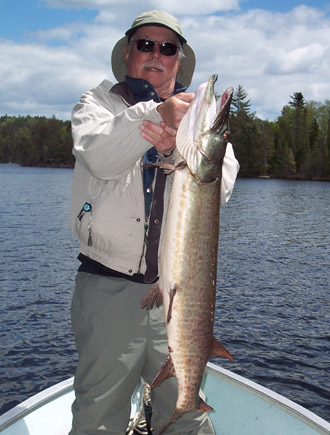
A nice muskie
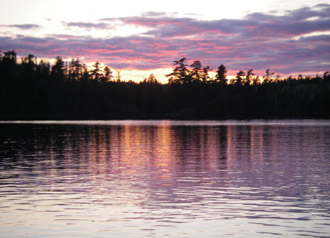
Sunset over Yoke Lake
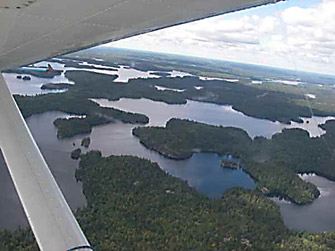
View from the float plane window
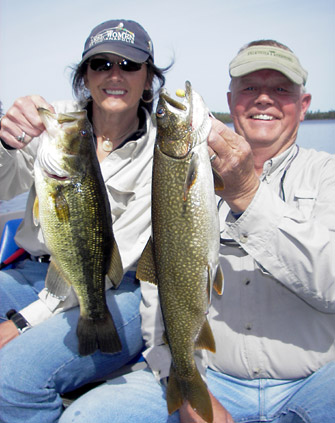
Largemouth and lake trout


